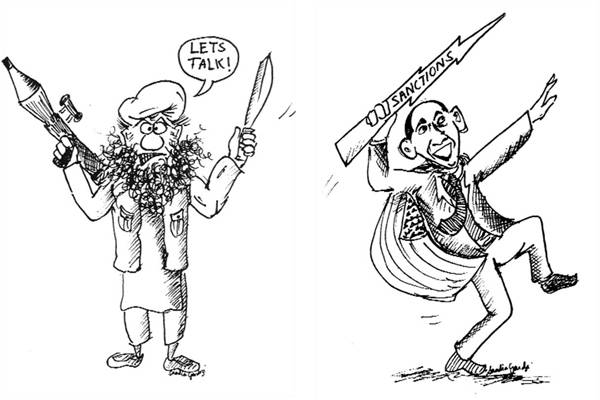
Intolerant India
Sir,
Whatever people think and say about economic and development issues during the on-going Parliamentary election in India, India will vote for or against mainly on one issue – Hindutva, which is mentioned in BJP’s manifesto as Ram Mandir, Article 370, common civil code, cow protection, and India being a natural home for persecuted Hindus.
First and foremost, people should understand that religious communalism (which caused the partition of India in 1947) still remains politically the most potent issue in India. There is a huge Hindu constituency all over Hindu majority India which is ready to become communal if there is a favorable political environment (like Modi as prime minister, with this communal agenda of BJP). It is not a coincidence that BJP, which had only two members in Loksabha in 1984, gained political ascendancy and power at the center and in various states on the issue of Hindutva from the days of the Ayodhya dispute and the consequent riots and massacres in which thousands of innocent Indians lost their lives.
People should also understand that every element of the Indian state (including its judiciary) is prejudiced in favor of Hindus in this matter.
With this background, the mention of “within the framework of the constitution” for constructing a Ram Mandir at Ayodhya should fool no one. Even if the BJP gives an affidavit in the Supreme Court of India to protect Babri Mosque, it could be demolished without any effective legal repercussions.
BJP’s opposition of Article 370 of the Indian constitution (which also maintains the demographic composition of the state of Jammu and Kashmir) also serves a communalist agenda. The BJP is saying that the Dalits of J&K are suffering because of this law. Even the Muslims of J&K admit that the law hampers economic progress, but they do not want it abolished because they fear that Hindus will flood Kashmir and change its demography.
They say the Indian military is showing its bravery by firing bullets on Indian civilian citizens of J&K, and that is a novel way of taking revenge by Hindus against Muslims, for Muslim invasions, Muslim rule, and India’s partition.
As a naturally corollary to the above mentioned communalism of Hindus, Hindu as well as Muslim communal forces will have a field day in the coming future of India. But what is more disturbing is that these communal forces (separately or in tandem with each other) may trigger some terrorist attacks in India in the near future to further polarize the country.
Therefore not only secular Indians but the global community should be on guard.
Hem Raj Jain,
Pennington.
One peace
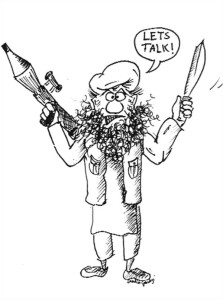
Sir,
The recent release of Taliban prisoners as a goodwill gesture for the accomplishment of peace talks on the occasion of Afghanistan’s presidential elections will obviously raise some noteworthy questions regarding the peace process.
Afghanistan’s presidential elections and the subsequent democratic transition are very significant for its internal stability as well as a clear signal to the retrogressive forces and their sympathizers. If some contrasting measures are being taken to impede this democratic process, the implications and consequences would be far harsher than ever thought.
Historically, Pakistan is considered to be the sole reason for instability in Afghanistan. The daydream of strategic depth, drastic responses to the Durand line problem, and deliberate participation in cold-war battles are all measures that have disrupted social and political development in Pakistan’s war-ravaged neighbor.
The consequences of securing the eastern part of Afghanistan at the cost of the stability of the northern part, and the promotion of madrassa culture are evident. Clearly this poor policy has backfired.
It is now important for Pakistan to play a positive role in the Afghan democratic transition, because it will lead to prosperity on both sides of Durand line.
Sarwar Mandokhail,
Zhob.
Russia risk
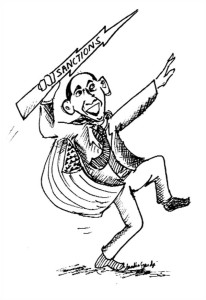
Sir,
The national and international print and electronic media have been replete with news on the critical Ukrainian crisis. The broiling conflict has acquired the status of an international issue, and after Russia’s occupation of Crimea the intensity of this crisis has increased further. Ties between the US, the European Union and Russia seem to be deteriorating rapidly. It is being feared that the crisis might intensify and become a cause for a greater conflict between major world powers.
US President Barrack Obama has warned that Russia would face sanctions designed to hurt specific economic sectors if it fails to de-escalate the situation in Ukraine. The statement came at the end of the recent nuclear security summit at The Hague. “We are prepared to take the next step if the situation gets worse,” he added.
Prime Minister Mark Rutte of the Netherlands, standing at a podium alongside Obama, said European countries support the US idea of sanctions, even though they might have global financial repercussions. “These sanctions would hit Russia very badly,” Prime Minister Rutte said. “And obviously, you can never guarantee that the people in Europe, in Canada, in the US would not be hurt. But obviously, we will make sure that we will design these sanctions in such a way that they will have maximum impact on the Russian economy.”
President Obama has conceded though that Russia has a right to station 30,000 of its troops near the eastern Ukrainian border. But he has urged Vladimir Putin’s government to seek a diplomatic solution of the crisis with Ukraine. He said it was up to the Ukrainian people to make decisions about how they organize themselves and who they interact with.
A point that the US President continues to strongly assert is that Crimea remains a part of Ukraine, even as the fledgling Ukrainian government in Kyiv ordered its troops to pull back from the disputed territory.
The Ukrainian crisis possesses every potential to blow out of proportion and drag the region and the major world powers into a war that could prove to be catastrophic for the entire world. It’s a crisis that merits undivided attention of the world powers that matter.
The option of diplomacy must be exercised to the maximum possible extent and that of imposition of political and economic sanctions as cautiously as possible. Any hasty moves may become a source of repentance later.
Russia and all other countries that have stakes in the Ukrainian crisis must appreciate the gravity of the situation and act sensibly in dealing with it.
M Fazal Elahi,
Islamabad.
Honor, prestige and sovereignty
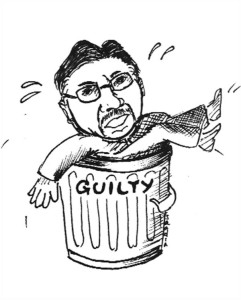
Sir,
Those who have benefitted most from this unfortunate country, made fortunes through abuse of power, allotment of state lands and kickbacks in procurement deals, have made it a practice to abandon this country, once out of power, adopt foreign residential status, leading lives of luxury and insist on claiming immunity from prosecution and accountability. Pakistan has been subjected too often to ridicule by its so called elite and it is time such abuses be stopped, otherwise chaos, insurgencies and terrorism will be its fate.
Those who say that Musharraf should be allowed to leave the country must understand that this country has given him honor and monetary compensation for serving in the armed forces and this cannot be used as a ploy or passport to abrogate or suspend the constitution. If individuals accused of such heinous crimes can be exempted from accountability on excuses of sickness of self or close blood relatives, then every murderer, rapist, robber and thug can claim such exemptions on the basis of such precedents.
The honor, prestige and sovereignty of Pakistan is far more sacrosanct than ego of any individual, to whichever institution he belongs, and whatever services he may have rendered in past.
Tariq Ali,
Washington, D.C.
Dark ages
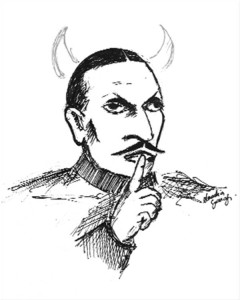
Sir,
Everyone admits the fact that Gen Ziaul Haq’s regime was the darkest period of our history.
He tried to make it look like he was a champion of Islam, but he was hypocritical. It was during his regime that drug problems and the Kalashnikov culture spread. Various Islamic groups were armed without regard to consequences. The same groups are now fighting against each other.
Today, people admit that he was neither true to Islam nor to Pakistan. He only introduced so-called Islamic laws and made amendments in the constitution to remain in power and to control the women and minorities of the country.
Some of these laws are abused not only against women and minorities, but also against twice as many Muslim men.
If Zia was so insincere, how can anyone support anything this man began? His time should be declared the darkest period of our history and all the laws and amendments he made in the constitution should be scrapped.
It is high time that the government of Pakistan officially disclaims Ziaul Haq and abolishes his so-called Islamic laws, amendments to the constitution, and ordinances, with immediate effect.
Abid Habib,
Mirpurkhas.
Beggars, choosers

Sir,
I want to draw the attention of the authorities and the general public towards the evils of street begging, which is assuming alarming proportions in our country.
Begging in the streets is such a long-established custom in our country, and the giving of alms has so many religious sanctions, that it is not easy to make people realize the social evils inherent in the institution. The man who dares point out its real character is in danger of being accused of unsocial habits. People may even go to the extent of calling him ‘mean’ and ‘uncharitable’. But it is worthwhile to decry this manifest evil even at the cost of public disapproval. Causal almsgiving helps no one. It only encourages idleness and mendicancy.
The most important question is, are all the beggars in the streets really poor and deserve help? The answer is obviously no. A large number of these beggars are able-bodied and can turn to some useful work if they like. But they find it easy to live on the charity of those who deem it highly religious to indulge in indiscriminate acts of charity. The misplaced generosity has gone a long way to create an army of parasites who live upon the wealth produced by others.
Even religion condemns indiscriminate charity which only encourages idleness and a life of dependence. If we are really interested in the welfare of the poor and the needy, we should organize a charitable relief fund for the poor, or set up poor-houses where the able-bodied beggars – men and women both – can be taught some useful means from which they can earn. To give even a penny to a poor beggar may help the giver feel relieved of his social duty, but it does not solve the problem of poverty. Rather, it intensifies it.
Aroosa Naeem,
Lahore.
Baby steps
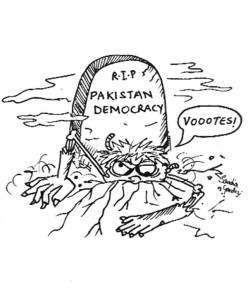
Sir,
India is the largest democracy in the world and the ongoing elections are going to be the world’s largest.
Some 814 million Indians, more than the entire population of Europe, will cast their votes to elect the 16th Lok Sabha in India. There are a total of 543 parliamentary constituencies in India, and the winning party or coalition needs 272 seats to form the next government. The voting process has been divided into 9 phases that began on April 7 and will conclude on May 12.
This voting will take place across the length and breadth of the country, from the deserts of Rajasthan to the tiny islands in the Indian Ocean. The Election Commission of India has assured that no person needs to travel more than 2 kilometers to cast his vote. In 2009, a polling booth was created in Western Gujarat so that one single voter could cast his vote.
Regardless of the outcome, this would not merely be an exercise of choosing a new government in New Delhi, but the results of the Indian elections will have an impact on the world at large and the region in particular.
Unfortunately, since the inception of Pakistan, our experience with democracy has not been pleasant, and we have remained unable to develop a potent political culture. We need to observe keenly the experience of India and the present developments and learn from our archrival.
Fortunately, we already are on right track since 2007. A good number of steps that we can take pride in – including the purging of dictatorial tempering in the constitution, increased provincial autonomy through the 18th amendment, development of a consensus on 7th NFC awards, formulation of an independent election commission, and a peaceful transition of power – have proved instrumental in fostering democracy, revitalising the parliamentary system, and strengthening national institutions.
However, a lot still needs to be done to establish a democratic culture.
Towards this end, devolution of power to the grassroots level through local election can go a long way in nurturing democratic culture and establishing better governance.
We should wish India a peaceful election and should learn from their experience.
Tassawur Bosal,
Mandi Bahauddin.

